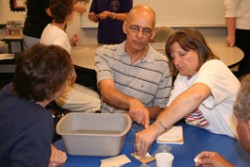 Education professor Jack Gerlovich, center, works with science teachers to create hands-on activities for their classrooms. |
In a crowded elementary classroom, elementary school teachers build palm-sized boats from corkboard, aluminum foil, tongue depressors and rubber bands.
Their goal: build a boat that floats the most marbles. But the result is much greater – their efforts serve as a reminder that hands-on science is more engaging than textbooks and lectures.
The activity is part of the first leg of the Science Pioneers Professional Development Program, a succession of three-week camps designed to keep science afloat in Iowa schools.
Drake professor Jack Gerlovich leads the project. He watches as the groups build boats that hold up to 120 marbles and fiddle with the concept of buoyancy. The teachers are so engrossed by the activity that they’re reluctant to quit when time is called by Gerlovich, the Ellis and Nelle Levitt professor of education and science safety.
This summer, Gerlovich is showing 20 teachers how mystery and fascination promote enthusiasm for learning. After two weeks of training, the teachers will soon put their new skills to use as they conduct inquiry-based lessons for 200 elementary students from four school districts in south-central Iowa.
Gerlovich says the lessons are invaluable in a time when test scores in science are falling nationwide and precious class time is being lifted from science to accommodate reading and mathematics. Also, many elementary teachers lack the science content background and successful techniques for keeping students interested.
“Research shows that most kids are turned off to science by sixth grade,” Gerlovich said. “To reverse that, we’ve first got to change how teachers teach science.”
Inquiry-based science is a “hands-on, minds-on” approach that whets youngsters’ appetites for knowledge by allowing them to investigate scientific phenomena before learning the textbook explanations behind them.
Instead of lecturing about buoyancy, for example, teachers might have kids perform the boat-building exercise.
Student training camps, where teachers will present inquiry-based lessons to students from Corning, Central Decatur, Mormon Trail and Murray elementary schools, are scheduled this week at Corning and Central Decatur elementary schools.
The inquiry-based approach appeals to college students as well, and could attract more to science.
Kaitlyn Hood, one of Gerlovich’s former students, once described herself as “science-phobic.” Now she’s a teacher for Des Moines Public Schools and also works in the education department at the recently opened $62 million Science Center of Iowa. She wrote an article with Gerlovich that’s scheduled to appear in the November issue of “Science and Children,” the journal of the National Science Teachers Association. The title is, “Pre-service Teacher Goes from Ick to Wow.”

